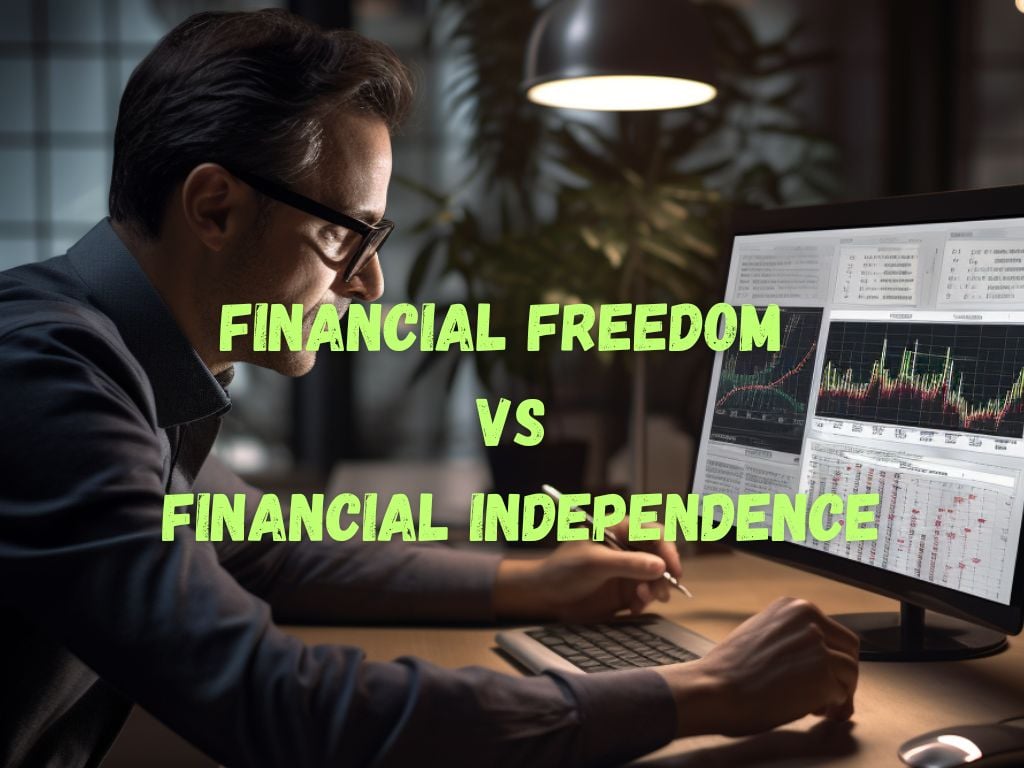For many people, achieving financial control is a top priority. The idea of financial independence and financial freedom are two concepts that are often discussed in the personal finance world.
Though they may seem interchangeable, they are actually two different stages on the path to financial control.
In this comprehensive guide on financial freedom vs financial independence, we’ll explore the differences and how you can achieve both in an effective manner.
Understanding Financial Independence
Financial independence means that you have enough passive income to cover your living expenses.
Essentially, this means that you no longer need to work to maintain your current standard of living. You have enough money saved and invested to live off the returns.
Benefits of Achieving Financial Independence
One of the main benefits of financial independence is that it allows you to pursue other interests without worrying about money.
You could retire early, travel, go back to school and learn something new, or simply volunteer your time to help others.
Additionally, achieving financial independence means that you can take more risks. You can invest in ventures that you’re passionate about without needing to worry about financial returns.
This can lead to more opportunities for growth and fulfillment.

Examples of How to Achieve Financial Independence
There are several ways to achieve financial independence, but the most common is through investing.
You can start by maxing out your retirement accounts and investing in low-cost index funds. You can also invest in rental properties or start your own business that produces passive income.
To achieve financial independence, it’s important to have a solid plan in place. You need to calculate your living expenses, estimate your future income, and determine how much you’ll need to save to reach your goal.
It also requires long-term thinking – you need to be patient and diligent as you work towards financial independence.
Potential Drawbacks of Financial Independence
While achieving financial independence is a worthy goal, it’s important to understand that it may not be for everyone.
As you work towards financial independence, you may need to make sacrifices in the short-term. You may need to live frugally and save aggressively to reach your goals.
Additionally, financial independence doesn’t necessarily mean that your life will be perfect.
You may still experience emergencies or unexpected expenses that require you to tap into your savings. It’s important to have a plan in place for these situations.
Understanding Financial Freedom
Financial freedom means that you have enough money saved and invested to cover your living expenses and pursue your passions.
Instead of needing to work to maintain your standard of living, you work because you enjoy it or because it adds value to your life.
Benefits of Achieving Financial Freedom
The main benefit of financial freedom is that it allows you to pursue your passions without worrying about money.
You can work on projects that you’re passionate about, volunteer your time, or pursue hobbies that bring you joy.
In addition, achieving financial freedom means that you can maintain your lifestyle indefinitely.
You don’t need to worry about running out of money in retirement or feeling trapped in a career that no longer brings fulfillment.
Examples of How to Achieve Financial Freedom
There are several ways to achieve financial freedom, but the most common is through passive income streams.
This can include rental properties, dividends from investments, or royalty income from creative works.
To achieve financial freedom, it’s important to focus on both saving and investing. You need to calculate your living expenses and determine how much you’ll need to save to cover them.
You can also look for ways to increase your passive income streams, such as investing in real estate or starting a blog.
Potential Drawbacks of Financial Freedom
While financial freedom may sound like the ultimate goal, there are still potential drawbacks to consider.
Firstly, achieving financial freedom requires a significant amount of upfront work and investment.
You need to have a solid plan in place and be prepared to invest time, money, and energy into building passive income streams.
Additionally, financial freedom doesn’t necessarily equate to happiness. Without meaningful work or purpose in your life, financial freedom may ultimately leave you feeling unfulfilled.
It’s important to consider how you’ll structure your life and find meaning beyond just financial freedom.

Financial Freedom vs Financial Independence: Let’s Compare the Both
While financial independence and financial freedom are often used interchangeably, they are actually two different concepts.
Understanding the Differences
While financial independence and financial freedom are often used interchangeably, it’s important to understand the nuances between these two concepts.
Financial independence refers to having enough passive income to cover your living expenses, freeing you from the need to work for income.
On the other hand, financial freedom encompasses the ability to maintain your desired lifestyle while pursuing your passions and interests, without worrying about money.
The Relationship
Financial independence is often seen as a prerequisite for achieving financial freedom.
You need a solid financial foundation to support your desired lifestyle and pursue your passions.
Once you’ve achieved financial independence and have passive income streams covering your basic living expenses, you have the freedom to choose the work you engage in, whether it’s a source of income or a passion project.
Factors to Consider When Choosing Your Path
When deciding whether to prioritize financial independence or financial freedom, there are several factors to consider:
Lifestyle preferences
Evaluate your values and priorities. Do you prioritize having complete control over your time and the ability to pursue your passions? Or do you prefer financial security and stability?
Understanding your lifestyle preferences will guide your decision-making process.
Time horizon
Consider your timeframe for achieving your financial goals. Financial independence may take longer to achieve, as it requires building and diversifying income streams.
Financial freedom may be more attainable in the short term if you have current resources or a specific passion with the potential for immediate income.
Risk tolerance
Assess your risk tolerance and ability to handle financial uncertainty. Achieving financial independence may require taking more risks, such as investing in businesses or rental properties.
Financial freedom can be achieved through diversified passive income streams or long-term savings and investments.
Purpose and fulfillment
Reflect on what brings meaning and fulfillment to your life. Are you primarily motivated by financial security or the pursuit of your passions? Consider how each path aligns with your personal values, goals, and overall well-being.

Choosing Your Financial Goals
Assessing Your Current Financial Situation
Before you can choose your financial goals, it’s important to assess your current financial situation.
Take the time to calculate your income, expenses, and savings. Understand your financial obligations and any debts you may have. This step will provide a clear starting point for setting your financial goals.
Identifying Your Priorities and Aspirations
Once you have a clear picture of your financial situation, it’s time to identify your priorities and aspirations. Consider the following questions:
- Short-term vs. long-term goals: Determine if you have any short-term financial goals, such as paying off debt or saving for a specific purchase. Balance these with long-term goals like retirement planning.
- Work-life balance: Reflect on the importance of work-life balance in your life. How much time do you want to allocate to your career compared to other aspects of your life? Consider whether financial independence or financial freedom would align better with your desired work-life balance.
- Passions and interests: Evaluate your interests and passions outside of work. How much do you value the ability to pursue these without financial constraints? Identify how achieving financial independence or financial freedom can support these interests.
Creating a Plan of Action
Once you’ve clarified your financial goals and priorities, it’s time to create a plan of action to achieve them.
Break down your goals into smaller, achievable steps, and establish a timeline for accomplishing each step.
Consider seeking guidance from financial professionals or mentors who can provide personalized advice and support.
Tips for Achieving Financial Control
No matter which path you choose, there are several key tips for achieving financial control:
- Start investing early and keep investing regularly.
- Create a budget and stick to it.
- Focus on eliminating high-interest debt.
- Max out your retirement contributions.
- Automate your savings.
Frequently Asked Questions
What is the difference between financial freedom and financial independence?
While the two terms are often used interchangeably, financial independence means that you can cover your living expenses without needing to work, while financial freedom means that you can maintain your lifestyle and pursue your passions without worrying about money.
Is financial independence achievable for everyone?
Achieving financial independence requires significant work and investment, and may not be achievable for everyone.
It also requires long-term thinking and a willingness to make sacrifices in the short-term.
Is financial freedom the ultimate goal?
Financial freedom is a worthy goal, but it’s important to remember that it doesn’t equate to happiness or fulfillment.
It’s important to have meaning and purpose in your life beyond mere financial freedom.

Conclusion
In conclusion, financial independence and financial freedom are two distinct concepts on the path to achieving true financial control.
Financial independence involves having enough passive income to cover living expenses, providing the freedom to choose how you spend your time.
Financial freedom expands on this by allowing you to maintain your desired lifestyle while pursuing your passions without financial constraints.
Choosing between financial independence and financial freedom depends on your individual goals, priorities, risk tolerance, and values.
Assess your current financial situation, identify your aspirations, and create a plan that aligns with your unique circumstances.
Regardless of the path you choose, remember that achieving financial control requires discipline, long-term planning, and a commitment to taking action towards your goals.
With determination and a clear vision, you can attain the financial control and freedom that best suits your needs and aspirations.


 Tags:
Tags:










